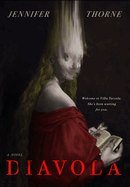
Although novels about terrible rich families have a certain gauche appeal, it can be difficult to emotionally connect with the characters they portray. In Diavola, Jennifer Thorne (The Antiquity Affair; Lute) tackles this challenge by sending one such family to a haunted villa in the Tuscan countryside for their annual vacation, skillfully building an oppressive atmosphere until readers find themselves sympathetic to the plight of the protagonist, Anna, despite her shortcomings. Anna has put off joining the annual Pace family trip, reluctant to subject herself to their particular brand of snide remarks and passive-aggressive criticism that stems from years of family tension and drama. Eventually she gives in to familial obligations, and once she arrives, things begin to go overtly and subtly awry: movement out of the corner of her eye, incessant scratching on the other side of a locked door to a tower in the villa, fresh food spoiling within minutes, and increasingly strange (and frightening) dreams.
The novel's gothic claustrophobia isn't contained to the villa, as Thorne slowly reveals that this isn't just a house haunting: it's a "[n]ameless, formless, paralytic" spirit, malevolent and fixated on Anna. And fleeing back to normal life won't bring her freedom. Thorne plays with time without jumps or signals; the narrative moves linearly until readers suddenly realize that a conversation was happening within another conversation--or maybe not even happening at all, but merely imagined. Days go missing. Memories contradict each other. Thorne pairs the idea of escaping family toxicity with the urgent need to also escape actual danger. Readers with a penchant for both horror and rich people behaving badly will enjoy this quick, sinister novel. --Kristen Coates, editor and freelance reviewer

